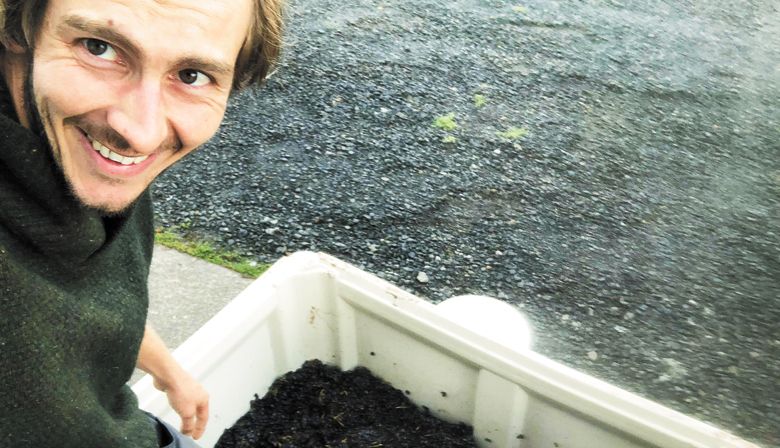For a Good Time, Call Leon Foch
Schaad Cellars crafts new hybrid
The 2018 Schaad Cellars Leon Foch features my favorite black dog since Led Zeppelin IV. It’s an unusual blend of French-American hybrids showcasing a not-so-urban legend.
A black dog dominates the label of the new 50-50 blend of Léon Millot and Marechal Foch made by Forrest Schaad. Why? Because a stranger walked up to Schaad at a tasting event and told him a ghostly tale.
The stranger told Schaad about a mysterious black dog that appears once in a blue moon on Rex Hill. In most cultures, a phantom black dog sighting is an omen of bad luck or even death. Newberg, however, does not represent most cultures. A sighting of this spectral pooch brings nothing but good luck.
The black dog’s hunting ground includes a Schaad family property just a bone’s throw from the estate vineyards of Anam Cara Cellars and REX HILL Winery. In 1952, Forrest’s grandfather, Benjamin Franklin Schaad, purchased the land to grow cherries, walnuts and the blackcap raspberries used by the local Dairy Queen in its sundaes and shakes.
In 1980, Dr. Doug “Fish” Schaad, Forrest’s father and an avid home winemaker, purchased a few acres of his father’s Newberg farm to plant Pinot Noir vines. Dr. Schaad, a professor at the University of Washington Medicine in Seattle, planted the vines after learning members of the Western Washington Amateur Winemaking Association lacked a source for Oregon Pinot Noir.
Dr. Schaad planted two rows of Marechal Foch and one row of Léon Millot in 1999.
Both grapes are French-American hybrids bred more than a century ago in Alsace by Dr. Eugène Kuhlmann. Both varieties are prized for their cold-hardiness and disease resistance.
“I wanted a deeper, darker red wine to complement my fascination with Pinot Noir,” Dr. Schaad says.
Intent on growing his own grapes in another section of his father’s property, Forrest and his brother, Garrett, began transplanting some of Dr. Schaad’s old nursery stock in 2007. Forrest also started growing his own rootstock in 2008. Dr. Schaad refers to the rows he planted from 1980 on as Schaad Vineyard. Forrest’s vineyard on the same property is named Schaad Hill Vineyard in honor of the original family homestead on the other side of Highway 99W.
Both sites are self-rooted and dry-farmed. Forrest claims the major difference between the two is row spacing and the fact that Schaad Hill has been no-till from the beginning.

Schaad Cellars 2018 Leon Foch
The wine is made with grapes from his father’s older vines and a small amount from vines he planted in 2008 at Schaad Hill Vineyard. Forrest co-fermented approximately equal parts Léon Millot and Marechal Foch, and aged it in neutral French oak barrels for 16 months to “let its fruit, earthiness and minerality shine through.”
Given the grapes involved, I was expecting the wine in my glass to be as inky purple as Katy Perry’s Manic Panic hair color from a few years ago. Instead, it was a shade of garnet closer to circa 1972 Ziggy Stardust — minus the eyepatch.
The nose also defied my expectations. There were no wild or funky aromas conjuring up thoughts of barnyards or foxes. The Leon Foch’s aromatic set includes blackberries and violets, with traces of cayenne pepper, graphite and cedar. It also possesses a mineral quality that reminded me of crushed limestone driveway stones after a light rain.
Extending the Led Zeppelin metaphor even further, this wine gives no quarter when it comes to flavor. Depth charges of black fruit detonated in my mouth. Was it black cherry, blackberry or blackcurrant? Yes.
Surfing that black fruit wave were notes of bittersweet dark chocolate and beeswax. The wine’s acidity is modest, but its tannins are sturdy. The finish rambles on for a good long time with bursts of espresso and fresh-turned earth.
“I want authentic wine to be available for a reasonable price,” Schaad said with a fair amount of emphasis. The Leon Foch retails for $22. You get your money’s worth with every sip.
In his 1973 book “The Wines of America,” Leon D. Adams wrote, “It is unfortunate that the demeaning word ‘hybrid’ was attached to the French-America varieties when they were first introduced in the United States. Were it not for this term, the wines made from these grapes would be judged impartially for whatever qualities they possess.”
Don’t overlook Schaad’s black dog because you think it lacks a Vitis vinifera pedigree. It would be a shame to miss this “best in show.”
The Changeup, a monthly column by Michael Alberty, is a baseball pitch designed to disorient and confuse. It’s the perfect representation of the unknown and its mastery over those who think they know what to expect. This column is devoted to those unorthodox Oregon wines you never saw coming.











